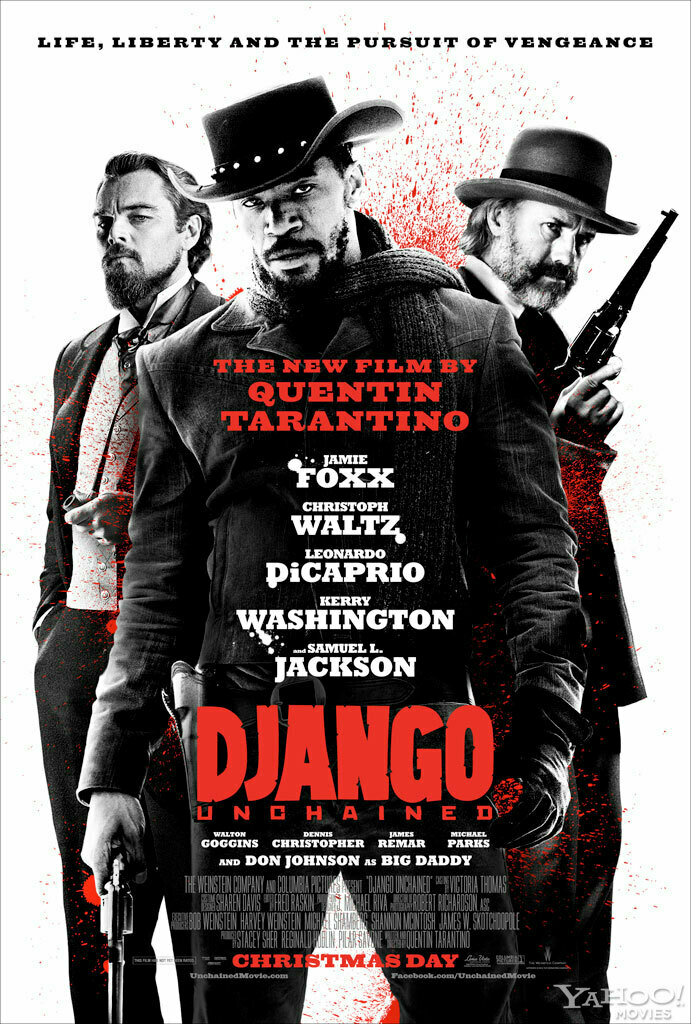Blog
Django Unchained (2012): A Review
Acting as essentially a third part of a revenge based trilogy (following the split-into-two Kill Bill and the joyous Hitler-killing fantasy of Inglourious Basterds), director Quentin Tarantino has decided to deliver us all a bloody and violent Christmas present, and he’s named it Django Unchained.
Much how Inglourious Basterds turned years of World War II tension into a celebration of film and violence, Tarantino focuses on a revenge fantasy to provide catharsis for America’s dark history of slave trading.  Using the spaghetti western as the template, Django Unchained puts the titular Django (Jamie Foxx),  a slave freed by a dentist turned bounty hunter (Dr. King Schultz, played with indelible joy by Christoph Waltz), on a journey of death and destruction as he seeks to find his long lost wife, Broomhilda (Scandal’s Kerry Washington).  But don’t think that this is just Tarantino just indulging his love for westerns and applying them towards a controversial direction - similar to Basterds, he goes beyond the “aren’t movies so COOL” style of filmmaking presented in his earlier work. While homages to other work are here, they aren’t the focus - instead the universal language of film used to ease us into rougher territory.  And rough this film can be.
Much can be discussed about the use of violence in this film - but what’s interesting is that violence is used in so many different forms here. You have violence as brutality (the awful “Mandingo fights” overseen by plantation owner Calvin Candie). You have violence as history (the brutal whippings and mistreatment towards slaves). You have violence as catharsis (pretty much every scene where Django is unleashed). You even have violence as humor (note an early run-in between Dr. Schultz and a local sheriff).  In a time where once again filmic violence is being discussed in the headlines, Tarantino presents how the intent can radically redefine the message of something shown on screen, and does so regularly.  I’m sure future film classes will have a field day with the ways that the movie re-frames different elements - see how in one scene whip scars are used for horror, but in another, an air of bad ass legitimacy.
There really is much to on chew in this film.  The performances are universally stellar, with Jamie Foxx at an all time peak (it’s very hard to imagine this film with the original star, Will Smith, in mind) and Christoph Waltz using the amazing charisma he demonstrated with Hanz Lanza in Inglourious Basterds, but this time, as a hero.  You have wonderfully comedic work from Don Johnson (yes, that Don Johnson) as plantation owner Big Daddy, plus a great cameo from Jonah Hill in arguably the movies funniest scene.  Leonardo DiCaprio does a fantastic job of turning his pretty boy history into something dark and twisted - his Calvin Candie is the most devious villain in Tarantino’s entire filmography.  However, the biggest surprise for me? Samuel L. Jackson.  Playing Candie’s right hand man, Stephen, he’s arguably the best role that Jackson has ever had.  Similar to how DiCaprio turns his famous face into somewhat of a farce, as Stephen, Jackson turns many of his acting ticks into something darker. I’m almost wondering how much of the role is intended as a criticism of the majority of Samuel L. Jackson’s work to date - as honestly, Tarantino has been the filmmaker to use him at his best.  Also, be sure to keep an eye out for many of Tarantino’s regulars, including Michael Parks and a very well hidden Zoe Bell.
Sure, many of the Tarantino tropes remain (retro looking credits, an anachronistic soundtrack), the wonderful Kerry Washington is terribly underused, and the script has a somewhat lengthy ending with an odd detour. But the fact remains this -Â Django Unchained is an absolutely unbelievable roller coaster of a film, and if you can handle the violence, it gives you a little bit of everything. Humor, drama, the light and the dark, and an interesting look at one of the ugliest periods in American history. Â Maybe it’s not the normal way to celebrate Christmas, but I certainly looked at this film as a gift. Highly recommended.

Wednesday December 26, 2012